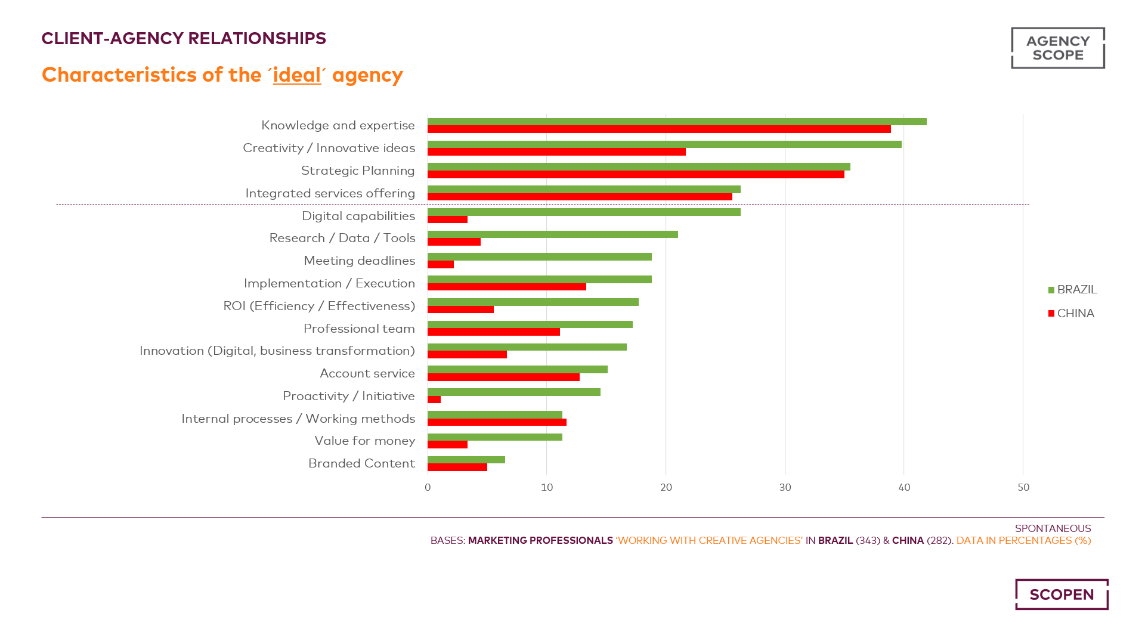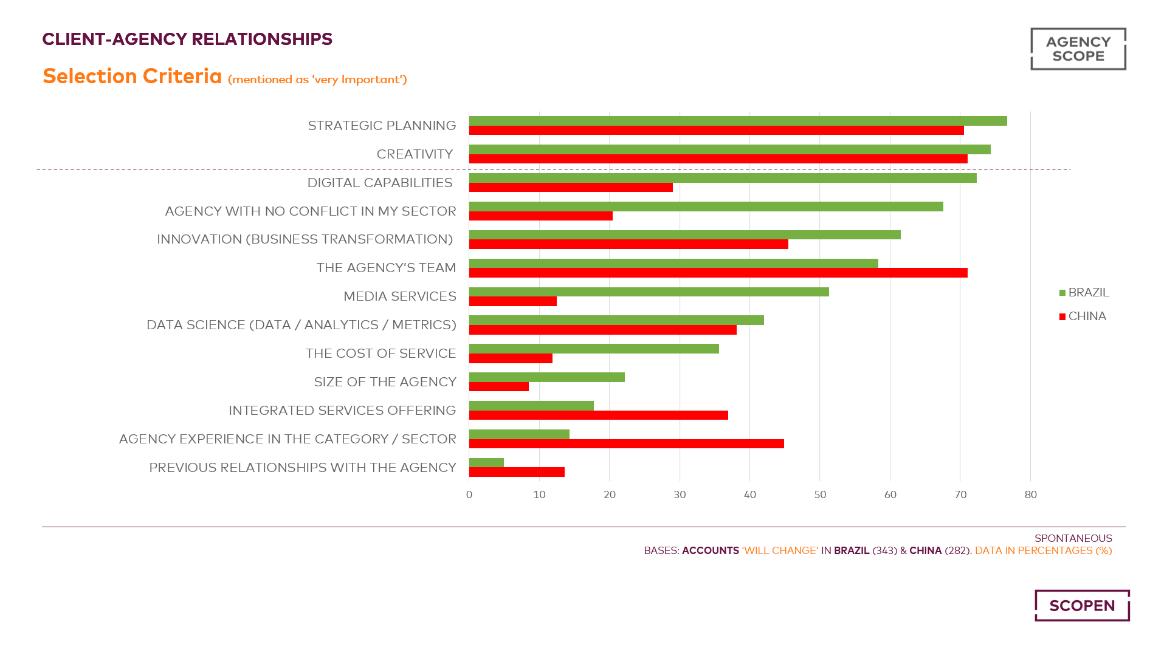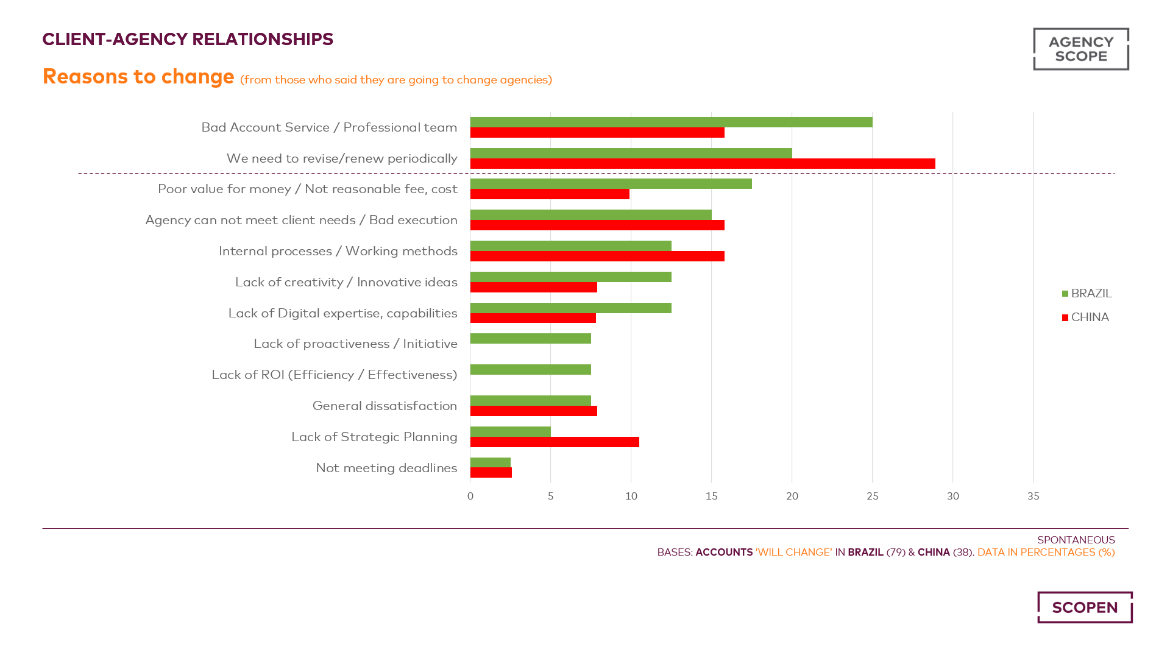SCOPEN’s Agency Scope study compares the relationship between clients and agencies across Brazil and China, based on interviews with each country’s largest companies according to adspend to explore their attitudes and perceptions of agency partners.
Why it matters
Marketers in Brazil and China agree that the ideal agency must be capable of strategic planning, in addition to deep knowledge and expertise, but there is a stark difference in expectations when it comes to digital capabilities and meeting deadlines.
Takeaways
- Marketers in Brazil work with their agencies for an average of five years versus the average of three in China.
- Brazil CMOs believe their agency contributes 61.7% to business growth against only 39.1% in China.
- But clients in both markets want excellent account service, and good internal processes and working methods.
Market knowledge and creative, innovative ideas are what companies in Brazil and China look for most in an agency but when it comes to meeting deadlines and value for money, there is a surprising divergence.
In 2020, during the early stages of the COVID-19 pandemic, AGENCY SCOPE analysed Brazilian and Chinese marketers’ investment in communications and clients’ relationships with agencies and other partners.
The report interviewed the largest companies by adspend and revealed some similarities between the two developing countries as well as huge differences.
Let us start with three major differences, which reflect the importance and prestige of the advertising industry in Brazil and marketers’ respect for agencies. This compares with China’s frequent change in agencies, and the perception of lower return on investment and contribution to growth.
- In Brazil, for every £100 in sales, a big company invests an average of £3.60 in communications. In China, the investment is £1.80 (also lower than in the 2019 study).
- Marketers in Brazil work with their agencies for an average of five years before deciding to change – longer than in China, where the average duration of relationships is only three years.
- CMOs in Brazil believe their agency contributes 61.7% to business growth. In China, this figure is just 39.1% (the total of a 17.4% contribution from creative agencies plus a 21.7% contribution from media agencies).
The perfect agency
There are similarities if we analyse how marketers in both countries define the ideal or perfect agency. Marketers want to work with agencies that:
- Have a deep knowledge (of the consumer, brands, media, trends etc)
- Have strong capabilities in strategic planning (linked to their data capabilities and the expertise in using them for planning)
- Provide creative and innovative ideas
- Can offer integrated services
While these four factors define the perfect agency for marketers in both countries, there are fewer mentions of but very similar levels of importance for excellent account service, good internal processes and working methods, and branded content expertise.

It is also interesting to note that marketers in Brazil are much more demanding. Beyond the above factors, they want research, deadlines met, good execution, effectiveness, proactivity, and value for money.
Digital needs
A further analysis of digital capabilities reveals another difference between Brazil and China.
- In Brazil, clients want to solve digital needs with their agencies (as fully integrated partners that solve all needs, even media because media agencies do not operate in Brazil).
- In China, clients work with many different digital specialists in different territories and therefore very few marketers think of digital within a single agency.
When selecting agencies and identifying relevant criteria, we also notice similarities between Brazilian and Chinese marketers.
- Strategic planning is the most important factor in both countries, followed by creativity.
- Innovation capabilities that lead to brand and business transformation, and the agency’s team are similarly important.
The biggest differences appear for digital, for the reasons mentioned earlier.
Media services are key in Brazil due to the non-existence of media agencies. Brazilian marketers are also more reluctant than the Chinese to work with agencies that have a conflict of interest in the same sector.

There are similarities between both markets when focusing on reasons for changing agencies. Clients in Brazil and China decide to change agencies mainly because of bad service or execution and because they need to revise their accounts periodically (due to procurement influence).
But value for money is mentioned much more in Brazil than in China.

In both countries, the three most mentioned marketers for their campaigns are:
- Burger King, Ambe, and Itaú – Brazil
- Mondelez, Tmall and Taobao – China
The top three marketers for their marketing are:
- Natura, Itaú and Magazine Luiza – Brazil
- Alibaba, Coca-Cola and Huawei – China
The three most creative agencies in Brazil are:
- Africa (Omnicom)
- Almap BBDO
- DPZ&T (Publicis Groupe)
Leading the creative ranking in China are:
- Ogilvy
- BBDO
- Amber (independent)
When marketers shortlist three agencies for a pitch, they are Africa, F.biz (WPP) and Wieden+Kennedy in Brazil, while Ogilvy, Socialab (independent) and BBDO are the three most mentioned in China.
The most “ideal” agencies in Brazil are DPZ&T, F.biz and David, while Ogilvy, Socialab and Publicis head the wishlist in China.
WARC and SCOPEN are currently conducting AGENCY SCOPE in the UK and also interviewing the largest companies by adspend. Key decision makers will be interviewed through April to analyse trends in the UK, the perception and image of agencies, consultancies, and digital platforms. The study is supported by ISBA.
If you are interested in having your voice heard in the UK study or, as an agency, would be interested to find out what your clients' agency perceptions are, please get in touch.

